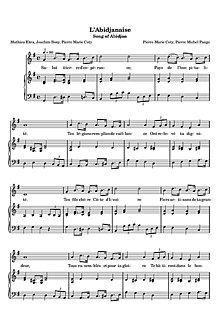| English: Song of Abidjan | |
|---|---|
 | |
National anthem of Côte d'Ivoire | |
| Lyrics | Pierre Marie Coty and Mathieu Ekra, 1959 |
| Music | Pierre-Michel Pango, 1959 |
| Adopted | 1960; 65 years ago (1960) |
"L'Abidjanaise" (English: "The Song of Abidjan") is the national anthem of Côte d'Ivoire, adopted under law number 60–207 on 27 July 1960. It takes the form of a lyric and very patriotic poem, invoking inspiring imagery expressing the greatness of the Ivorian soil and values such as hope, peace, dignity, and the "true brotherhood".
History
Adopted in 1960 at the country's independence, "L'Abidjanaise" remains the national anthem of Côte d'Ivoire, though the de jure capital is now Yamoussoukro, while Abidjan remains the economic capital and retains some political functions. This hymn is strongly tinged with patriotism and influenced by religion. The lyrics are from ministers Mathieu Vangah Ekra and Joachim Bony. The music was composed by abbots Pierre-Marie Coty and Pierre-Michel Pango, taking "La Marseillaise" as a model.
Between 2007 and 2009, under the leadership of Laurent Gbagbo, there was a proposal to replace "L'Abidjanaise" with a different song, "L'Ode à la Patrie" as the national anthem. This Ode was composed in 2002 after the start of the Ivorian civil war, and was selected by contest in 2003. "Ode à la Patrie" was sung by supporters of the now former head of state and broadcast on the RTI's television network instead of "L'Abidjanaise" until 2007, even though the latter remained, according to the constitution, the country's national anthem. However, the proposal was eventually dropped.
Lyrics
| French original (official) | Nouchi lyrics (by Nash du Gbonhi) | English translation |
|---|---|---|
|
I |
I |
I |
Notes
- Sometimes written Tous rassemblés et pour ta gloire ("All gathered together and for thy glory").
- Occasionally written with the singular unie.
References
- (in French) L'histoire méconnue des hymnes nationaux africains – Radio France International
- (in French) Chant patriotique: "L'Ode à la patrie" au cabinet du ministre de l'enseignement technique – article from allAfrica website published on 18 February 2003
- (in French) Changement des fondements de la Côte d`Ivoire : Hymne national : "L`Ode à la Patrie" à la place de "l`Abidjanaise" ? – article from the Nouveau Réveil tabloid dated from 28 December 2009.
- "Formation des enseignants des établissements privé – Module de physique chimie" [Training of Teachers in Private Establishments – Physics and Chemistry Module] (PDF). Direction de la Pédagogie et de la Formation Continue (in French). July–August 2019. p. 114 (113 in file). Retrieved 24 April 2022.
- Yorokpa, Paul Senior (14 February 2018). L'abidjanaise: Une relecture de l'hymne national ivoirien pour la réconciliation (in French). Editions L'Harmattan. pp. 18–19. ISBN 978-2-14-007039-6.
- Boutin, Akissi Béatrice; N’Guessan, Jérémie Kouadio (2015). "Le nouchi c'est notre créole en quelque sorte, qui est parlé par presque toute la Côte d'Ivoire". HAL-Francophonie Afrique et Océan Indien. Abidjan: Université Félix Houphouët-Boigny. p. 7. Retrieved 24 April 2022.
- "L'Hymne nationale de Côte d'Ivoire traduite en nouchi". Ivoire Actu – Les blogs de France24. 13 December 2012. Retrieved 24 April 2022.
- Code de lavie :education civique et morale (in French). Les Nouvelles Editions Africaines. 1984. p. 46. ISBN 978-2-7236-0641-7.
- Morel, Colombe (2006). La vérité sur la guerre en Côte d'Ivoire et les intérêts politiques (in French). Publieur. p. 81. ISBN 978-2-7549-0061-4.
- Jeune Afrique l'intelligent (in French). Groupe Jeune Afrique. 2002. p. 10.
- Desanti, Dominique (1962). Côte-d'Ivoire (in French). Rencontre. p. 245.
- Samba, Alioune Badara (1970). Congo nouveau; réalités: Politiques, économiques, diplomatiques de la R.D.C. (in French). Samitex Congo. p. 725.
Further reading
- (in French) Mathieu Vangah Ekra [fr], Lumière sur l'Abidjanaise : l'hymne national, CEDA, 2000, ISBN 2863943650
External links
- (in French) The Republic's symbols on the Ivorian presidency's website
- Video of the Song of Abidjan, sung in its entirety